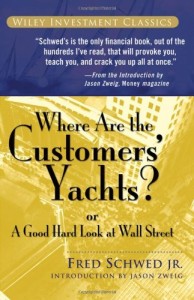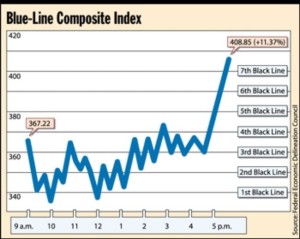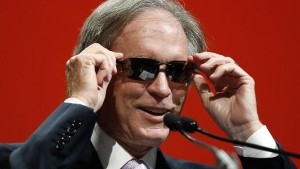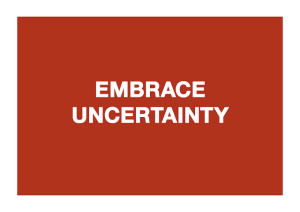

Somewhere on my Top 5 thematic topics on Bankers Anonymous is a hard-core media critique – which I refer to in kinda-joking-kinda-not joking shorthand as the “Financial Infotainment Industrial Complex.”
When I read the Wall Street Journal or listen to financial news on the radio I find myself talking back – usually although not always silently – to the journalists, complaining about the coverage. The more I know about the financial topic, the more I complain.
My complaints tend toward several common themes:
- The coverage relies on a specific anecdote, or a journalist reporting that ‘some people feel that’, without any big-picture or data-rich context around that anecdote or that ‘some people feel’ story.
- The expert opinions come from people with a vested (financial) interest. On Wall Street this is known as ‘talking your book,’ in which a trader consistently offers a view of the world to others that most supports his trading position. I am never surprised to learn that someone in the insurance industry, for example, can speak eloquently about the benefits of an insurance product.
- Negative stories about financial and economic news dominate positive stories 10 to 1, leaving the unsophisticated individual investor constantly battered by (mostly) unwarranted fears that in a purely rational sense should have zero affect on their personal financial attitudes and actions.
- The topic du jour usually has absolutely zero relevance to a rational individual investor as well as to the vast majority of institutional investors. Gold! Bitcoin! Twitter IPO! Herbalife!
- Simplistic, moralistic, cartoonish coverage by journalists of different roles in the economy. (Banker = Greedy. Home loan borrower = victim and moral paragon. Small Business = Plucky. Big Business = Soulless.)
Typically I complain silently to myself, shake a metaphorical fist at the newspaper or radio, and then I occasionally vent my frustrations by typing out a Bankers Anonymous post blasting the Financial Infotainment Industrial Complex. That can sometimes calm my nerves.
I have not tended to dwell on the profit-motive of media companies themselves and the swiftly-shifting economics of media companies.
I usually do not get upset about the profit-seeking of media companies because
a) I’m a red-blooded American capitalist (Amurica! Heck Yeah!) so I don’t want to begrudge any designated for-profit company’s attempt at wealth creation; and
b) I don’t know any better
I usually do not get upset about the swiftly shifting economics of media companies because
a) I don’t get a paycheck from any media companies, and
b) I have an optimistic (possibly simplistic) view that what we are in the process of losing in traditional print and analog forms we are more than gaining through the newly unleashed forces of digital media.
André Schiffrin, the author of Words and Money, has spent a lifetime firmly in the traditional print media camp as a publisher (Pantheon Books), founder of a publisher (New Press), and author. He is also a Frenchman in America. And he is deeply concerned about these latter problems that I haven’t considered much – the for-profit model that appears to be serving us badly, and the shifting economics of the media business. His book has given me food for thought.
A few of his bigger ideas, which I’m still mulling over, deserve attention.
How much profit is appropriate for book publishers?
I learned from Schiffrin that up until the last decade or two, the publishing industry worldwide generally contented itself with a very modest profit margin, on the order of 2-3% profit per year. Picture here the independent gentleman publisher, concerned with the ideas as much as the business. With the recent consolidation of global media conglomerates, however, stodgy book publishing became the low-profit step-child of higher-growth, higher-profit media ventures like television, cable, and newspapers.
Media executives and media investors – seeking to maximize their own opportunities – shoe-horned low-profit book publishing into the demands of higher-profit companies. The result, according to Schiffrin, is a highly risk-averse publishing climate, in which independent publishers wither and die, and only blockbuster authors and titles get promoted.
In addition, as Schiffrin describes it, book-publishing houses got the Bain Capital treatment: buy the company, add a ton of debt financing, fire the expensive and experienced talent, extract maximum financial value – and then sell. In the widget-production business, we can (sort-of) objectively admire this move to greater efficiency, but in the book-publishing business, even a capitalist like me can see that the world of ideas is hollowed out and made poorer by this kind of profit-first approach.
At a Barnes and Noble big box store you can see that the offerings reflect the priorities of for-profit book publishing, rather than the priorities of a thoughtful reader. Schiffrin cites numerous statistics from the US and Europe about the increasingly endangered species known as the independent bookstore.
Is book publishing and book selling different from widget-making?
In the context of ideas and culture, I’d say yes.
I don’t have enough knowledge of that world to have any solutions, but Schiffrin makes a compelling case about the problem.
Schiffrin’s solutions come from Europe, in which a combination of governmental and non-governmental (University, or non-profit) institutions fill in the gaps and keep independent book publishing alive, essentially through non-market subsidies.
Movies as an important cultural media, deserving of protection
This seems strange to say, but I never consider the movie industry as a serious part of the cultural ecosystem of my country, but I realized from this book that my American bias has blinded me somewhat. I always think of Hollywood as a purely profit-driven mega-business, so I forget that movies meaningfully contribute to the culture.
I mean, Transformers and X-men, right? I never give it much thought.
Schiffrin, who hails from the European context, does give it a lot of thought. He cites the Norwegian film industry, French Cinema, or the Korean film industry as successful examples of government-subsidized media with a big contribution to make to the cultural milieu.
Why don’t I think of movies a serious cultural contributor? Schiffrin’s book has helped me see now that it’s because independent movies are nearly impossible to find in this country. Independent movie theaters are even rarer than independent bookstores, and movie chains simply will not leave money on the table to show limited-audience or challenging films.
Unless you’re a serious movie nerd living in Cambridge, MA you can’t find independent films in the US.
Did you know Norwegian theatres are 90% municipally owned, and that allows them to maintain a substantial outlet for Norwegian films?
I know some clever reader will point out that all sort of independent films from the US could probably be downloaded if I looked into it.
Two problems with that response:
- I’m not a movie nerd, so I would not know where to start.
- Watching a movie in a theater is not the same as streaming it on my laptop.
- I would prefer a shared cultural experience, brought about by an independent theater owner with a vision, rather than me engaging in a deep-dive into a singular, unshared project.
I wonder what our world would be like if independent film production and screening actually happened in the US.
Changing economics and functions of digital media
I am less concerned about this than Schiffrin, again possibly because of my ignorance. He suggests a variety of non-market subsidies for journalism, such as foundation support or government support for the cost of producing news. Like most of Schiffrin’s ideas, I have a hard time imagining that catching on broadly, at least in the US context.
I am reminded of Warren Buffet’s prediction a few years ago that newspaper ownership would become appropriate only for philanthropists, seeking out a combination of prestige and good will, but certainly not profits. Even as newspapers have struggled to remain profitable, Buffett himself acquired many newspapers last year as investment propositions, not philanthropy.
Meanwhile, digital news aggregation sites such as Drudge Report, Gawker, Huffington Post and Business Insider offer a new model for news consumption, if not for producing original journalism, as previously understood.
I’ve enjoyed Henry Blodget’s periodic updates on The New York Times’ struggle –to adapt to the changes underway in the shift from print to digital. As a proxy for the business challenges, as well as the cultural shifts at stake, the Times both explains and illustrates the debate for me
Schiffrin’s Words and Money does not explain everything that’s wrong with book publishing, the soullessness of Hollywood, or the impending death of journalism. His outlook is possibly too distrusting of profit-seeking by media companies, and possibly too hopeful for the meliorating influence of government subsidies for my taste.
On the other hand, when we wonder why independent bookstores die, newspapers slash reporting budgets, and big-budget movies provide as much food for thought as a marshmallow – he’s got a point. The completely free market in these areas leads to some grim results. Follow the money.
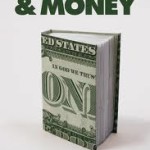
Post read (21786) times.




